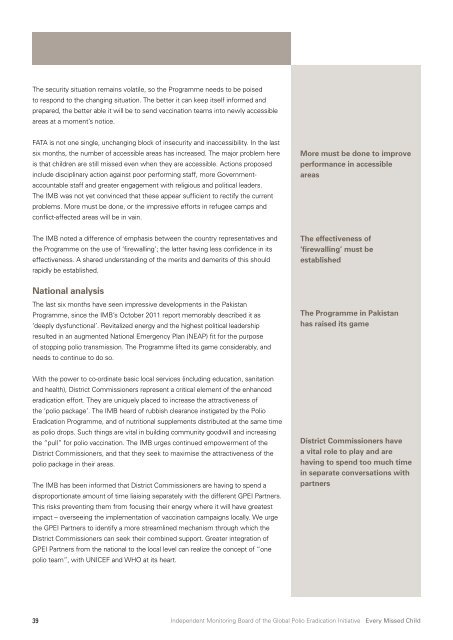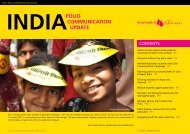Independent Monitoring Board - Global Polio Eradication Initiative
Independent Monitoring Board - Global Polio Eradication Initiative
Independent Monitoring Board - Global Polio Eradication Initiative
- No tags were found...
You also want an ePaper? Increase the reach of your titles
YUMPU automatically turns print PDFs into web optimized ePapers that Google loves.
AT A GLANCEThe security situation remains volatile, so the Programme needs to be poisedto respond to the changing situation. The better it can keep itself informed andprepared, the better able it will be to send vaccination teams into newly accessibleareas at a moment’s notice.FATA is not one single, unchanging block of insecurity and inaccessibility. In the lastsix months, the number of accessible areas has increased. The major problem hereis that children are still missed even when they are accessible. Actions proposedinclude disciplinary action against poor performing staff, more Governmentaccountablestaff and greater engagement with religious and political leaders.The IMB was not yet convinced that these appear sufficient to rectify the currentproblems. More must be done, or the impressive efforts in refugee camps andconflict-affected areas will be in vain.More must be done to improveperformance in accessibleareasThe IMB noted a difference of emphasis between the country representatives andthe Programme on the use of ‘firewalling’; the latter having less confidence in itseffectiveness. A shared understanding of the merits and demerits of this shouldrapidly be established.National analysisThe last six months have seen impressive developments in the PakistanProgramme, since the IMB’s October 2011 report memorably described it as‘deeply dysfunctional’. Revitalized energy and the highest political leadershipresulted in an augmented National Emergency Plan (NEAP) fit for the purposeof stopping polio transmission. The Programme lifted its game considerably, andneeds to continue to do so.The effectiveness of‘firewalling’ must beestablishedThe Programme in Pakistanhas raised its gameWith the power to co-ordinate basic local services (including education, sanitationand health), District Commissioners represent a critical element of the enhancederadication effort. They are uniquely placed to increase the attractiveness ofthe ‘polio package’. The IMB heard of rubbish clearance instigated by the <strong>Polio</strong><strong>Eradication</strong> Programme, and of nutritional supplements distributed at the same timeas polio drops. Such things are vital in building community goodwill and increasingthe “pull” for polio vaccination. The IMB urges continued empowerment of theDistrict Commissioners, and that they seek to maximise the attractiveness of thepolio package in their areas.The IMB has been informed that District Commissioners are having to spend adisproportionate amount of time liaising separately with the different GPEI Partners.This risks preventing them from focusing their energy where it will have greatestimpact – overseeing the implementation of vaccination campaigns locally. We urgethe GPEI Partners to identify a more streamlined mechanism through which theDistrict Commissioners can seek their combined support. Greater integration ofGPEI Partners from the national to the local level can realize the concept of “onepolio team”, with UNICEF and WHO at its heart.District Commissioners havea vital role to play and arehaving to spend too much timein separate conversations withpartners39<strong>Independent</strong> <strong>Monitoring</strong> <strong>Board</strong> of the <strong>Global</strong> <strong>Polio</strong> <strong>Eradication</strong> <strong>Initiative</strong> Every Missed Child




